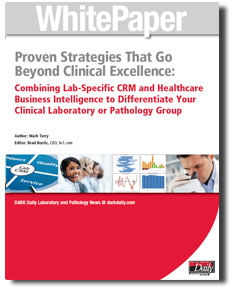Manhattan Labs is an early-adopter of the trend toward increased use of lab-specific CRM solutions with the goal of gaining competitive advantage
To improve its competitive position in the tough clinical laboratory testing market of New York City, one medical laboratory company has implemented a cloud-based, lab-specific customer relationship management (CRM) service that delivers real-time information to its sales team in the field and its operations team in the lab.
This is consistent with an important trend gathering momentum within the clinical laboratory industry. That trend is the use of middleware and similar informatics solutions that serve up detailed information about the performance and operation of the lab in real time. Typically, these informatics solutions support real-time management dashboards.
Pathologists and clinical laboratory managers recognize that good client relations can be the difference between retaining and losing clients—and the revenue associated with their medical laboratory test referrals.
Manhattan Labs of NYC Now Uses a Lab-Specific CRM
In New York City, Manhattan Labs has implemented a lab-specific CRM. Manhattan Labs competes in what is considered the nation’s most competitive market for medical laboratory testing services.
Manhattan Labs had several specific goals it wanted to achieve. “One primary strategy here is for us to differentiate ourselves by offering personalized, concierge-level service,” stated Ken Cerney, CEO. “We focus on endocrinologists, cardiologists, rheumatologists, OB/GYNs, IVF specialists, and internal medicine physicians in our service area.
“We think the hc1.com lab-specific CRM we now use is essential to helping us achieve and sustain a level of service that physicians recognize and appreciate,” added Cerney.
Manhattan Labs has 170 employees and four pathologists. It performs 1.5 million billable tests annually in a core lab in Pine Brook, New Jersey. The company also operates a STAT lab in midtown Manhattan. It recently received capital infusion from venture capital investors. (See The Dark Report, “Manhattan Labs Gets Infusion of Equity Cash,” February 11, 2013.)
Healthcare CRM Solution Now Used by Medical Laboratory Company
“It was last summer when Manhattan Labs activated its cloud-based CRM solution throughout the company,” explained Laura C.H. Johnson, Manhattan Labs’ Vice President of Marketing. “Before utilizing this CRM solution, our lab company had many of the problems most medical laboratories have managing the data needed to support the best client relations.

Pictured above is Laura Johnson, Vice President of Marketing at Manhattan Labs in New York City. Her clinical laboratory company is pursuing a strategy it calls “concierge lab service” as one way to differentiate itself from competing medical laboratory companies. Manhattan Labs is using a cloud-based, lab-specific client relationship management service in order to improve its service performance with its client physicians. (Photo copyright Manhattan Labs.)
“All labs have different methods of managing data and tracking the business intelligence they need on specific clients and the marketplace itself,” she continued. “Lab managers will often use spreadsheets. These can be cumbersome and don’t allow the various departments to work together seamlessly. Typically, without a lab-specific CRM, different departments in the lab work in silos, meaning that analyzing data can be cumbersome.”
“But in addition to helping us manage our customers, our solution has a business intelligence (BI) module that allows us to go beyond CRM,” she added. “The BI part of the program allows us to see a wide variety of business metrics, including test volume and profitability levels for individual accounts.”
Lab-Specific CRM Delivers Faster Answers to Client Service Questions
By giving its sales reps access to the lab-specific CRM via mobile devices, Manhattan Labs believes it gains a competitive advantage. “The business intelligence features of our CRM give us quick insight into what we’re doing with each client, such as turnaround time for specific tests running each day,” noted Johnson. “Our sales reps find it very easy to use on sales calls because it’s also accessible on their iPads.”
The use of this CRM in the field by Manhattan Lab’s sales reps is an example of how the Internet and advances in wireless technology are giving clinical laboratories and pathology groups new ways to improve the quality of customer service they deliver to clients.
Clinical Laboratories Can Use the Cloud to Access Data in Real Time
Access to real-time business intelligence can improve patient outcomes in ways that physicians recognize and appreciate. “Assume one of our client physicians sees 100 patients each year with elevated glucose levels,” said Johnson. “It could be that 50 of them have elevated levels of hemoglobin A1c, but only half of those patients have returned for follow-up testing. Our CRM provides our sales and service teams with this intelligence in the field, enabling Manhattan to be a trusted advisor to our physician clients.”
How Medical Labs Can Help Physicians Improve Patient Outcomes
“Our CRM means we can alert the physician that those 25 patients need follow-up visits,” she said. “That allows the physician to improve patient care.
“In our service region, we believe that no other lab company in our market can do that,” stated Johnson. “This is significant for us because this real-time access to detailed business intelligence distinguishes us from our competitors. It allows Manhattan Labs to deliver on our promise of providing concierge-level service to our client physicians.”
Because more clinical laboratories and pathology groups are working to differentiate themselves by making service excellence their top priority to attract new clients and stave off intense competition, Dark Daily has published a free White Paper on this topic.

There are simple steps clinical laboratory managers and pathologists can take to harness the power of business intelligence (BI) and customer relationship management (CRM) solutions to improve client service and lab operations. DarkDaily.com published this useful White Paper which reviews current market trends associated with the use of BI, along with information on how proper deployment of CRM systems can help a laboratory organization differentiate itself from lab competitors in the marketplace. This White Paper can be immediately downloaded at darkdaily.com.
The White Paper is titled, “Proven Strategies That Go Beyond Clinical Excellence: Combining Lab-Specific CRM and Healthcare Business Intelligence to Differentiate Your Clinical Laboratory or Pathology Group.”
As a trend, at this point in time, it appears that clinical laboratories are moving faster to adopt business intelligence solutions and CRMs than anatomic pathology group practices. That is expected to change, however, as price cuts for surgical pathology services are fully implemented by Medicare and private payers.
Medical Lab Sales Reps Use BI on Their Smartphones
Further, as noted above by the marketing vice president of Manhattan Labs, it is now relatively inexpensive and easy to equip sales reps and customer service teams with smartphones and tablet computers. This enables them to sit in a client’s office and access accurate, real-time information. The lab-specific CRM and healthcare BI solution are two ways that this lab company believes it can fulfill its business strategy of being a “concierge laboratory” to clients in New York City.
That raises an interesting question. Is Manhattan Labs “raising the bar” on customer service levels in this regional market by its use of a lab-specific CRM? If true, how long will it be before competing clinical labs and pathology groups decide they need to implement their own lab-specific CRMs? As fast as the market moves these days, it may not take long before we have answers to these questions.
—Joseph Burns
Related Information:
Clinical labs embrace Business Intelligence
6 ways to use business intelligence software
HEALTHCARE INFORMATICS—Top Tend IT Trends: Their Relevance for Pathology and Clinical Laboratories



